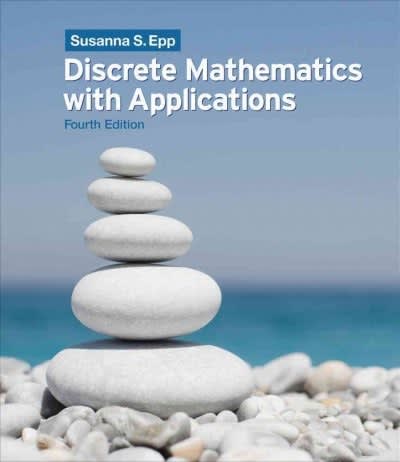Question
The City Department of Health has found out that a very infectious strain of influenza (transmission probability 0.3) is likely to hit soon for which
The City Department of Health has found out that a very infectious strain of influenza (transmission probability 0.3) is likely to hit soon for which the current vaccine is not effective. So far the DOH think about 100 people in the city have been infected. We know that influenza illness usually lasts for an average of 5 days and for every 1000 people who get influenza 1 person requires intensive care for 2 days. The population in the city is 80,000. The R0 (the basic reproductive rate) for this strain of influenza has initially been estimated to be 4.
Using the SIR model to answer following questions.
Q1) What is the likely contact rate for this epidemic of influenza? Provide a justification for your answer and show any work. (1 point)
Q2) The City Department of Health (DOH) recommends avoiding unnecessary travel, so that the contact rate becomes 0.000032 for this scenario. Assuming that this contact rate stays the same over time, when is the peak of the influenza epidemic likely to occur? Provide details to support your answer and show all work if that applies. (1 point)
Q3) The City DOH repeat their recommendation about avoiding unnecessary travel, and the contact rate
now becomes 0.000025 for this scenario. The city hospital's Intensive Care Unit (ICU) can only handle
50 cases at the same time, and there is no alternative ICU available. The DOH wants to ensure the city
hospital does not run out ICU beds, even if all ICU beds are used for influenza cases. The DOH knows
that a policy of asking everyone to wear a mask will reduce the influenza transmission probability to 0.29.
Would such a policy be sufficient to ensure that there are enough ICU beds at the peak of the epidemic?
Explain why or why not by providing details and any calculations to support your answer.
Q4) The city DOH repeat their recommendation about avoiding unnecessary travel, but the contact rate
remains 0.000025. The city DOH is unsure if sufficient supplies of masks are available, so they also want
to evaluate a different policy of giving all influenza cases Tamiflu instead of asking people to wear masks.
Tamiflu reduces the duration of influenza by 1 day on average. Describe how the influenza epidemic
would change if this policy was implemented successfully without the use of masks. In addition, would
there be sufficient ICU beds if this policy were implemented? Provide details and any calculations to
support your answer.
Optional Extra Credit Question: Q5) The city DOH want to assess a new policy, where they assume the
contact rate is 0.000032 but they will now have a new influenza vaccine. The problem is they will only
have time to vaccinate 25% of the population before they are likely to catch influenza (assuming that all
vaccinated people are immune immediately to the new strain). How will the peak number and the
cumulative number of influenza cases change compared to the conditions in Q2? Provide a justification
for your answer and show any work.
Step by Step Solution
There are 3 Steps involved in it
Step: 1

Get Instant Access to Expert-Tailored Solutions
See step-by-step solutions with expert insights and AI powered tools for academic success
Step: 2

Step: 3

Ace Your Homework with AI
Get the answers you need in no time with our AI-driven, step-by-step assistance
Get Started


